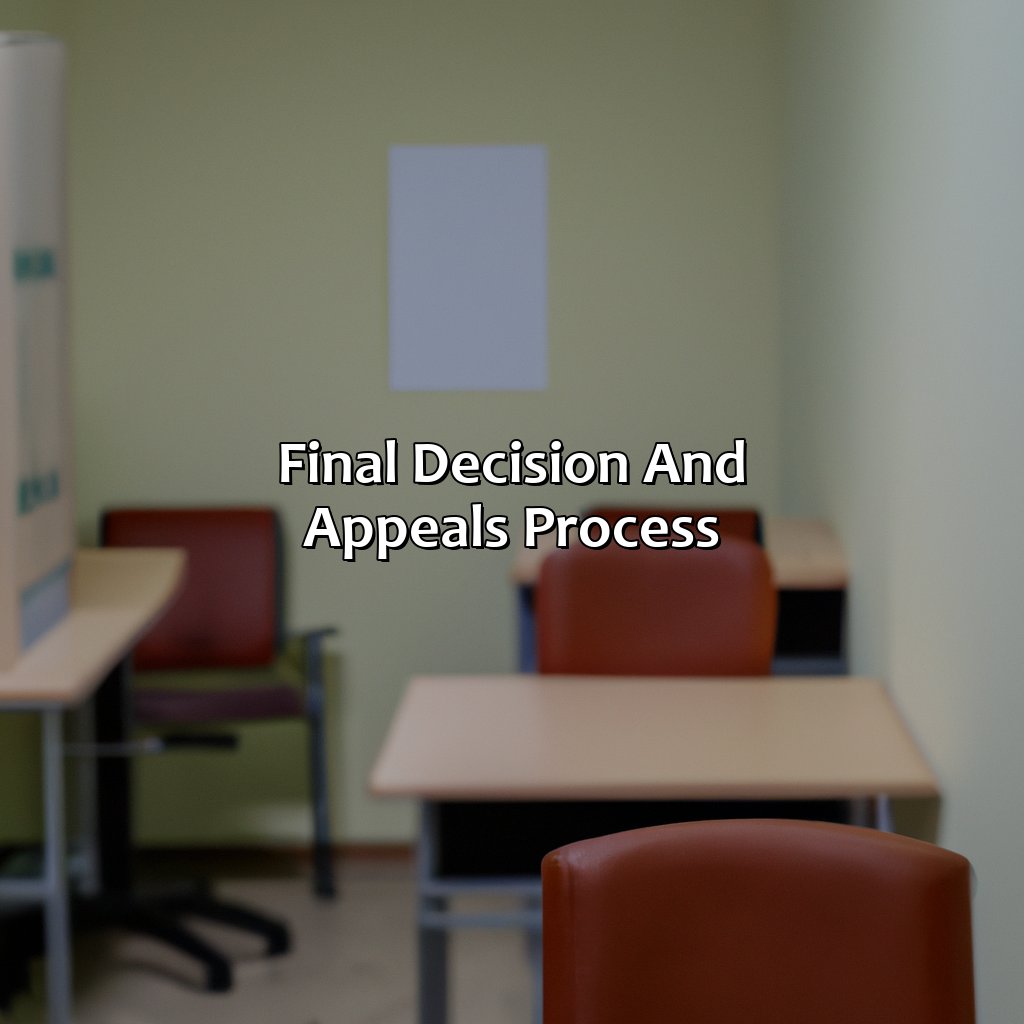What To Expect From A Social Security Disability Psychological Exam?
Key Takeaways:
- A social security disability psychological exam evaluates a person’s ability to work and function in daily life due to mental health conditions.
- The purpose of the exam is to gather evidence to support the individual’s disability claim and determine eligibility for benefits.
- During the exam, expect to undergo a thorough interview process and psychological testing to assess your cognitive, emotional, and behavioral functioning.
- The common tests used in a social security disability psychological exam include intelligence tests, personality tests, and neuropsychological tests.
- Preparing for the exam includes completing any necessary paperwork and obtaining medical records that support your claim.
- After the exam, the results are sent to the Social Security Administration for review, and a final decision on eligibility is made.
- If the claim is denied, there is an appeals process available to challenge the decision.
Feeling uncertain about a Social Security Disability (SSD) psychological exam? You’re not alone. This article provides an overview of the exam process, outlining what to expect and how to prepare for success.
Overview of Social Security Disability Psychological Exam
When applying for Social Security Disability benefits, a psychological exam may be required. This exam is used to determine the extent of mental and emotional impairments that affect the individual’s ability to work. The exam may involve answering questions, discussing past medical history and symptoms, and performing certain tasks to assess cognitive abilities. It is important to be honest and cooperative during the exam, as it can greatly impact the outcome of the disability claim. Additionally, it is helpful to bring any relevant medical records and inform the examiner of any medications being taken. By following these suggestions, the individual can ensure an accurate assessment of their mental and emotional limitations.

Image credits: retiregenz.com by Adam Duncun
Purpose of the Exam
The Social Security Disability Psychological Exam is designed to assess a candidate’s mental capacity to work. A social security disability claim will be rejected if the candidate fails to demonstrate their mental impairment. Therefore, this exam measures the legitimacy of the claim and identifies the candidate’s need for treatment and rehabilitation. The exam assesses factors such as cognitive functioning, mood disorders, personality disorders, and psychotic disorders. It also assesses the impact of mental illness on the candidate’s daily life, including their social functioning and daily living activities.
It is important to note that this exam is not a test of intelligence, and the candidate’s score does not determine the disability claim’s outcome. Instead, it provides a comprehensive report that highlights the candidate’s mental capacity and the effect of mental illness on their daily life. The examiner will also provide recommendations for treatment and rehabilitation, and this report will be used by the Disability Determination Services to determine the claim’s validity.
Pro Tip: The candidate should be honest and open during the exam to receive a comprehensive report that accurately reflects their mental capacity.

Image credits: retiregenz.com by David Woodhock
What to Expect During the Exam
Ready for your social security disability psychological exam? This section explains the process! It’s entitled ‘What to Expect During the Exam.’ We’ll go over the interview process and psychological testing. Knowing what to expect can help you feel calmer during the exam.
Let’s check out the sub-sections!

Image credits: retiregenz.com by Yuval Arnold
Interview Process
The procedure of the Social Security Disability Psychological Exam comprises multiple stages that can seem overwhelming. The initial part involves an interview with the examiner to discuss your medical history and symptoms. During the conversation, you will be asked many questions to diagnose the extent of your psychological disorder, which may include your emotional condition, thoughts, and behavior patterns.
The interview process would then continue with a series of tests, including intellectual and cognitive ability assessments and personality measures. For instance, IQ tests could help understand your problem-solving skills, which are closely linked to critical thinking ability. Moreover, personality assessments like Minnesota Multiphasic Personality Inventory (MMPI) could reveal emotional or thought disorders like depression or anxiety more accurately.
Additionally, it’s essential to prepare honestly for the exam as providing incorrect information could harm your case. Not only can dishonesty damage your credibility as a claimant but puts across a negative picture on your ability to tell the truth about important facts in general.
Based on instances from past cases related to psychological exams for SSD claimants, some individuals tried to present themselves by exaggerating their symptoms’ severity rather than objectively detailing their medical history and current conditions. Therefore it’s crucial not to get overly anxious about answering every question incorrectly. Instead, try sharing specific details about how the disabling problem has impacted daily activities like work or personal life. With honesty and openness during each stage of the examination process, navigating through it becomes less challenging.
Ready to ace your psychological testing? Just remember, it’s not about being sane, it’s about acting like you are.
Psychological Testing
Psychological Evaluation
During the social security disability application process, a psychological evaluation is common. A trained professional will assess an applicant’s mental health to determine their ability to work and if they qualify for benefits. In some cases, the evaluator may use standardized tests to gather additional information about an individual’s mental health, cognitive abilities, or current emotional state. These tests can include personality assessments, intelligence tests, or specific symptom inventories.
It’s essential to be honest and candid during the evaluation and provide a truthful account of how your disabilities limit you from working. It’s also important to note that the evaluator is looking for consistency in your responses throughout the exam.
Remember that this evaluation can significantly impact your chances of receiving benefits. Thus it’s crucial to prepare yourself adequately and approach the test with a clear mindset.
Don’t miss out on any essential details about what you should expect from a social security disability psychological exam. By understanding what you are being evaluated for and what questions may arise, you can feel more comfortable and confident during the assessment process.
Prepare to be prodded and poked both mentally and physically, as common tests used in social security disability psychological exams leave no stone unturned.
Common Tests Used
To get a grasp on the Social Security Disability Psych Exam, check out intelligence tests, personality tests, and neuropsychological tests. These tests are meant to measure different parts of your mental health and functioning. The results could seriously affect your disability claim.

Image credits: retiregenz.com by David Duncun
Intelligence Tests
Assessment of Cognitive Abilities
The Social Security Administration may conduct a psychological evaluation to determine the cognitive abilities of a candidate. This evaluation is performed to understand how impairments affect day-to-day activities and job performance. The examiner may use intelligence tests, such as the Wechsler Adult Intelligence Scale or the Kaufman Assessment Battery, to assess cognitive skills, such as processing speed, memory recall, reasoning ability, and problem-solving.
Additionally, the examiner may evaluate perceptual-motor abilities that are assessed through tests like the Bender Visual-Motor Gestalt Test. These tests can cover a broad range of functions from visual perception to fine motor coordination. The scores from these tests are used to determine the individual’s intellectual functioning.
Pro Tip: The test results play an important role in determining eligibility for disability benefits. Therefore, individuals should come prepared with a clear understanding of their medical history and current condition.
Would you like to learn more about yourself than you ever wanted to know? Take a personality test for your social security disability exam!
Personality Tests
Psychological Assessments for Social Security Disability
- Individuals seeking social security disability may face personality tests to examine their mental and emotional wellbeing.
- The tests are conducted to evaluate factors such as anxiety, depression, and overall cognitive abilities.
- The most common personality test administered is the Minnesota Multiphasic Personality Inventory (MMPI).
- The MMPI typically involves over 500 true/false questions that assess various aspects of an individual’s psychological state.
- Other tests may include IQ and memory assessments, as well as interviews with a licensed psychologist.
In addition to evaluating an individual’s temperament and psychological state, personality assessments during social security disability evaluations often examine aspects such as motivation, level of self-care, and ability to interact socially.
A select group of individuals have claimed that they have been subject to biased evaluations centered around cultural or ethnic biases regarding their psychiatric evaluations. The Office of Inspector General forthwith launched its investigation into the abuse by certain doctors in Texas against the disability claimants they examined.
Why just have one test to prove you’re crazy when you can take multiple neuropsychological tests and really drive the point home?
Neuropsychological Tests
The evaluation of cognitive and behavioral functions is crucial to determine disability eligibility. These assessments, which we shall refer to as functional tests, gauge the patient’s capacity to perform daily activities and their ability to engage in social interactions.
Functional tests can evaluate executive functions such as planning, decision-making, and reasoning; memory capabilities; attention span; language tasks related verbal fluency, comprehension, or repetition; visuospatial perception skills such as orientation or hand-eye coordination; fine motor control like writing or typing, among other abilities.
Apart from functional tests, psychological exams might also include a clinical interview of the patient with a psychiatrist or psychologist trained in psychosocial assessment. This process aims to collect information about the individual’s mental state, medical history, and external factors that may affect his/her functioning levels.
It is essential to note that Neuropsychological testing is only one aspect of disability evaluation and should not be considered the sole determinant of an individual’s disability status.
According to Social Security Disability Resource Center, “About 70% of initial claims are denied by SSA.”
Preparing for a psychological exam feels a bit like studying for a really twisted pop quiz that you never wanted to take in the first place.
Preparation for the Exam
Preparing for Your Social Security Disability Psychological Examination
Before your scheduled disability psychological exam, it is important to understand what it entails and how to prepare for it. To get started, gather all necessary medical records, as well as a list of medications and any current treatment plans. Practice being honest about your symptoms and experiences, and be mindful of any potential biases or exaggerations that may affect your results.
During the exam, you can expect the psychologist to assess your mental health, cognitive abilities, and functional limitations related to your disability. This may include a series of questions, tests, and observations that gather information about your ability to concentrate, remember, communicate, and interact with others.
To ensure the most accurate results, it is important to communicate openly and honestly about your experiences and limitations. This will help the psychologist make an informed decision about your eligibility for disability benefits.
It is worth noting that the Social Security Administration only approves approximately 30% of initial disability claims, and many applicants are denied benefits on their first attempt. However, with proper preparation and communication during your psychological exam, you can increase your chances of approval and secure the financial assistance you need.
According to the Social Security Administration’s official website, “As of August 2021, there were nearly 9 million people receiving disability benefits under the Social Security disability insurance (SSDI) program.”

Image credits: retiregenz.com by Harry Duncun
What Happens After the Exam
After the Social Security Disability Psychological Exam, you may wonder about the next steps. Firstly, the exam report is sent to the Disability Determination Services (DDS). DDS reviews the report and additional claim evidence to make a decision about the level of disability. They will notify you of their decision. It is important to provide any additional information requested promptly to prevent delay.
If DDS approves your application, you will receive your first benefit payment. If DDS denies your application, you can appeal their decision within a specific timeframe. You may need to provide additional medical or psychiatric evidence during this process. Remember to keep copies of all documents sent to DDS.
It is important to note that each case is unique, and there may be additional steps based on the specific circumstances. Therefore, it is recommended to contact a qualified disability attorney for further assistance.
One client was initially denied until his attorney documented all of his physical and mental health factors. Because of the appeal and his attorney’s efforts, he was ultimately approved.

Image credits: retiregenz.com by Joel Arnold
Final Decision and Appeals Process
After the Social Security Disability Psychological Exam, the claimant receives a final decision. This decision can be appealed if it is unsatisfactory.
The appeals process involves requesting a review of the case by the Social Security Administration. If the review decision is unsatisfactory, the claimant can request a hearing before an administrative law judge. This judge will decide based on the written evidence and any oral testimony given.
The judge’s decision can be appealed by the claimant to the Appeals Council, which can either grant or deny the request for a review. If the Council denies the review, the claimant can take the case to federal court.
If a claimant misses the deadlines for any of these steps, they may lose the opportunity to appeal, resulting in a denial of benefits. It is important to stay on top of the process and ensure that all necessary steps are taken to avoid missing out on the benefits they deserve.

Image credits: retiregenz.com by David Duncun
Five Facts About What To Expect From A Social Security Disability Psychological Exam:
- ✅ A Social Security Disability psychological exam is used to evaluate a claimant’s mental capacity to work and the extent of their disability. (Source: Social Security Administration)
- ✅ The exam will typically be conducted by a licensed psychologist or other mental health professional. (Source: Disability Secrets)
- ✅ The exam may involve a clinical interview, psychological testing, and a review of medical records. (Source: NOLO)
- ✅ The exam may take several hours to complete, and the claimant may be asked to perform certain tasks or answer various questions. (Source: Disability Benefits Center)
- ✅ The results of the exam will be used to determine the claimant’s eligibility for Social Security Disability benefits. (Source: Social Security Disability Help)
FAQs about What To Expect From A Social Security Disability Psychological Exam?
What is a Social Security Disability Psychological Exam?
A Social Security Disability Psychological Exam is an evaluation of your mental health by a licensed mental health professional to determine whether or not you qualify for disability benefits from the Social Security Administration.
What should I expect during a Social Security Disability Psychological Exam?
During the exam, you can expect the mental health professional to ask you a variety of questions about your mental health history, current symptoms, and your ability to perform daily tasks. You may also be asked to complete some written or verbal tests.
How long does a Social Security Disability Psychological Exam take?
The length of the exam varies depending on the complexity of your case, but generally, the exam lasts between one and two hours.
Do I need to bring anything to the exam?
It is important to bring any medical or mental health records you have, as well as a list of any medications you are currently taking. If you have any concerns or questions about the exam, you should bring those up with the examiner as well.
What happens after the exam?
After the exam, the mental health professional will prepare a report that summarizes your symptoms and their impact on your ability to work. This report will be used by the Social Security Administration to help determine your eligibility for disability benefits.
How long will it take to receive a decision after the exam?
The length of time it takes to receive a decision varies depending on the complexity of your case. Generally, you can expect to receive a decision within three to five months after the exam.


